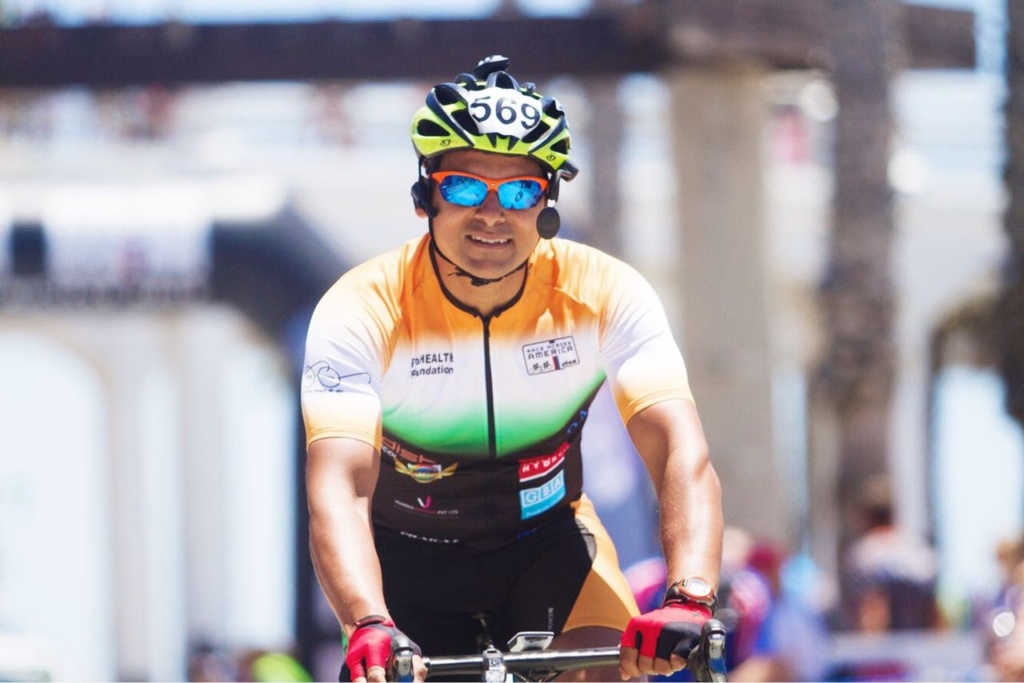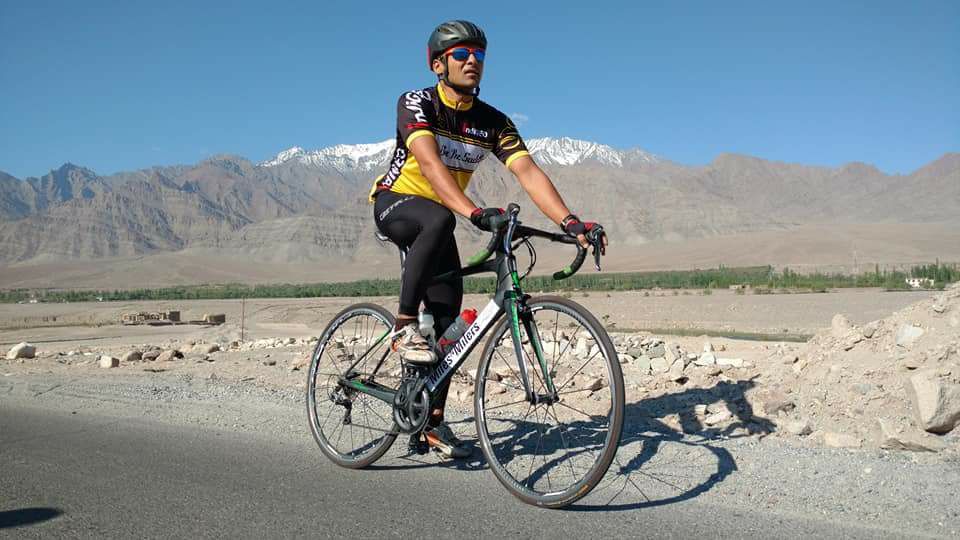Amit Samarth took on a ride along the Golden Quadrilateral Highway network across India to register the fastest time by a cyclist.

Pedaller’s path: Notes from a race along the Golden Quadrilateral
Ultra-cyclist Amit Samarth just finished the 6,000-km run. Strangers turned up to cheer him on, offer heartwarming khichdi and juices. But the roads were so much worse than he’d expected, he says.
At dusk on February 20, Amit Samarth was on the outskirts of Bhubaneswar in Odisha. He’d been cycling for six days on his Ride Across India — a solo bicycle challenge along the 6,000-km Golden Quadrilateral highway network — pedalling through heat and cold for about 20 hours a day.
And suddenly, there on both sides of the highway, were hundreds of commercial sex workers dressed in all their finery. “I had never seen anything like it before. Of all the things I saw, it stuck in my head,” Samarth says.
By the time the 40-year-old pedalled to a stop back where he had started out, in Mumbai, he had missed his target of finishing in under 12 days. Yet, there was reason to celebrate. His time of 13 days and 9 hours was still the fastest on the stretch, breaking an existing record of 14 days, 23 hours and 52 minutes, set by Bharat Pannu in 2020.
Samarth is no newbie to the world of ultra-cycling. In the past, he has finished endurance races such as the Race Across America (4,940 km from coast to coast) and the Trans-Siberian Extreme (9,100 km from Moscow to Vladivostok in Russia).

When he was looking to pull off a big ride in India, he trained his eyes on the 6,000-km Quadrilateral since it “sounded like a nice number to work with”. The uncertainties of India’s roads made it the perfect test of endurance — and as it turned out the state of the roads did cause him the most distress.
After setting out from Mumbai at 3 am on February 15, Samarth breezed across the Western Ghats, aided by cool weather, making good time until Bengaluru. Then the heat hit, as well as dismal road conditions and a series of diversions.
“These are some realities of riding in India that you can never be prepared for,” he says, now back home in Nagpur. “In hindsight, maybe I should have taken a hybrid bike along to tackle the bad stretches. For instance, a 120-km, under construction patch between Vijayawada and Rajahmundry in Andhra Pradesh was a nightmare. It broke my rhythm, ate away time and completely messed with my head.”
And then there was the traffic. A 40-km stretch in Visakhapatnam, also in AP, took close to three hours; columns of trucks on the shoulder brought him to a crawl between Bhubaneswar and Kolkata. Uttar Pradesh was a nightmare, with narrow escapes from vehicles that gunned straight for him, routinely cruising on the wrong side of the road. The last straw was the patch between Delhi and Jaipur, where he lost six hours in a jam caused by an accident and a protest march to Delhi.
“After another delay riding out of Delhi, it became clear that I wouldn’t meet my target, despite being in good physical shape. It broke my heart,” he recalls.
Yet each time Samarth was in need of inspiration, there was someone to lift his spirits. Strangers following his progress online would get together to greet him when he rode into their towns, treating him to home-made khichdi, freshly squeezed fruit juices or coconut water. In Udaipur, a lively band welcomed him as members of the cycling community took to the streets to celebrate.
His 22-member crew kept him engaged with pep talks and the even-more-essential massage sessions and gulab jamuns on demand. “At last count, I think I’d eaten about 150 through the journey,” Samarth says, chuckling.
On the final stretch between Ahmedabad and Mumbai, Samarth drifted in and out of sleep on the busy highway and decided to take a break. He dozed for a little over an hour, a luxury, given that he had slept for only 30 hours over 13 days. He was now dreaming of the finish line. At first light, he was off, stopping only once he had stepped off his cycle in Mumbai.
By the end, Samarth had not just signed off another mammoth ride, but also raised ₹7 lakh for budding athletes at the Lok Biradari Prakalp (LBP), an NGO founded by the late social worker Baba Amte. “We have about 30 promising athletes there who come from the Adivasi community,” says Jeetendra Nayak, a member of the Maharogi Sewa Samiti that runs the LBP. “Through the ride, Amit raised money which will go towards providing them with the necessary infrastructure to train.”
ON THE ROAD
* Amit Samarth, 40, took up endurance cycling in 2015. Before then, he had led a regular life working as a public health physician and raising two children with his wife Mukul, an interior designer.
* He first took up ultra-cycling so he could participate in triathlons. At 35, he quit his job to focus on a career as an endurance sports coach and sports entrepreneur.
* On the Golden Quadrilateral ride, he was aided by a crew of 22 (including IT professionals, a physician and a physical trainer).
* Life on the road was what he’d expected, Samarth says. He and his crew ate anything they could find along the way — boiled potatoes, khichdi, sandwiches of jam or just butter and sugar, and lots of gulab jamuns. What was worse than he’d anticipated were the roads and traffic. When it became clear that the roads would cost him his target of under 12 days, “it broke my heart,” he says.
* Next, he wants to focus on the Full Ironman Triathlon and attempt the Race Around Austria.